In Colombia, peace is a journey
Date:
From its mountains to its coasts, the civil war in Colombia raged for more than 50 years, before the final peace agreement was signed between the Colombian Government and the Revolutionary Armed Forces of Colombia (FARC) in 2016.
Fifty years is a long time. The conflict impacted more than 8 million people and waged a war on women’s bodies. According to Unity for Victims, a national organization, there have been 29,133 registered victims of conflict-related sexual violence since 1985, the majority of whom were women and girls.
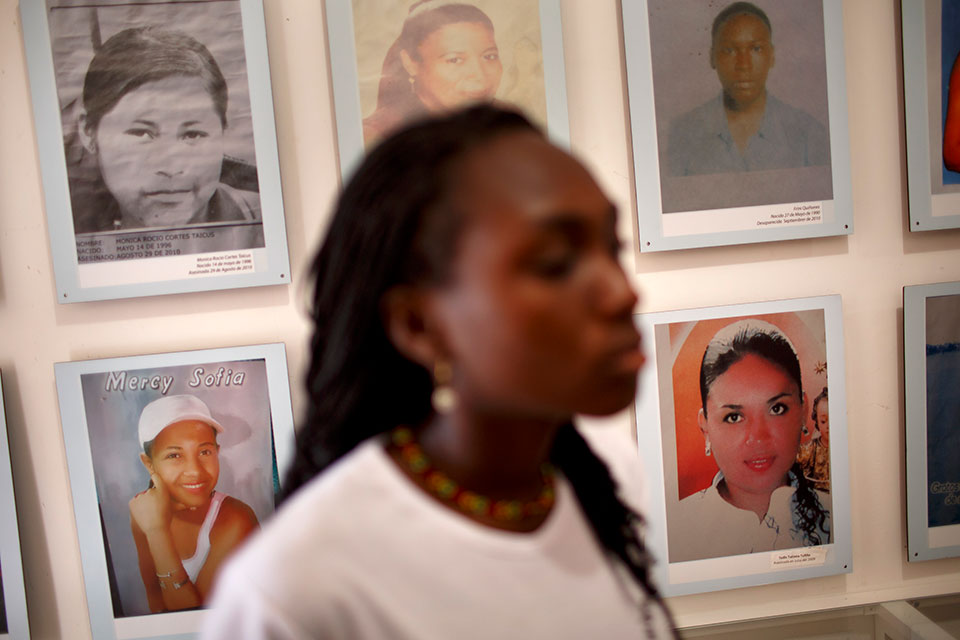
Almost three years since the peace agreement was signed, fresh challenges have emerged because of the resurgence of armed groups, drug trafficking and the unfolding humanitarian crisis in Venezuela that has driven more than 4 million migrants and refugees to Colombia. [1]
The conflict in Colombia has left deep scars, and lasting peace is more of a journey than a destination. The one thing that remains constant in this journey is the power and perseverance of women forging peace against all odds, defending human rights every day.
Through projects funded by the Government of Sweden and Norway, UN Women has accompanied Colombian women in this journey.
Growing coffee, brewing peace
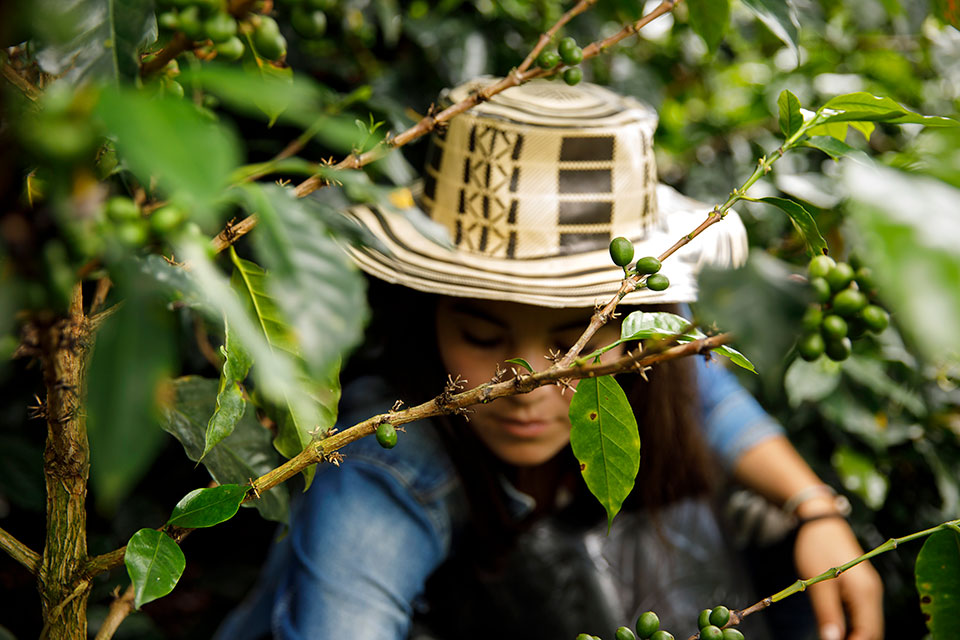
In the lush green mountains of El Tablón de Gómez, a small municipality in the southeast of Nariño territory, Cielo Gomez can never forget the conflict.
“In April 2003, there was a conflict between the guerillas and the army. We were all afraid. A child was killed in the crossfire in La Victoria. The military went to every house, looking for the guerillas and threw out our things—mattresses, clothes, everything…”
The attacks sent entire communities running to hide in the mountains, leaving their homes, land and any possessions that they couldn’t physically carry with them. The Gomez family were among those who decided to come back after a month in hiding, as they had nowhere else to go.
“When we returned, we found that the roof of our house was destroyed, there was no electricity…The army said they had killed and buried the guerillas in mass graves.”
For years, the residents of Nariño reeled from the effects of the conflict. Now, finally, some of them, like Cielo Gomez, have started feeling hopeful about a better future. She is a coffee grower, and thanks to the land restitution process, now owns her own piece of land.
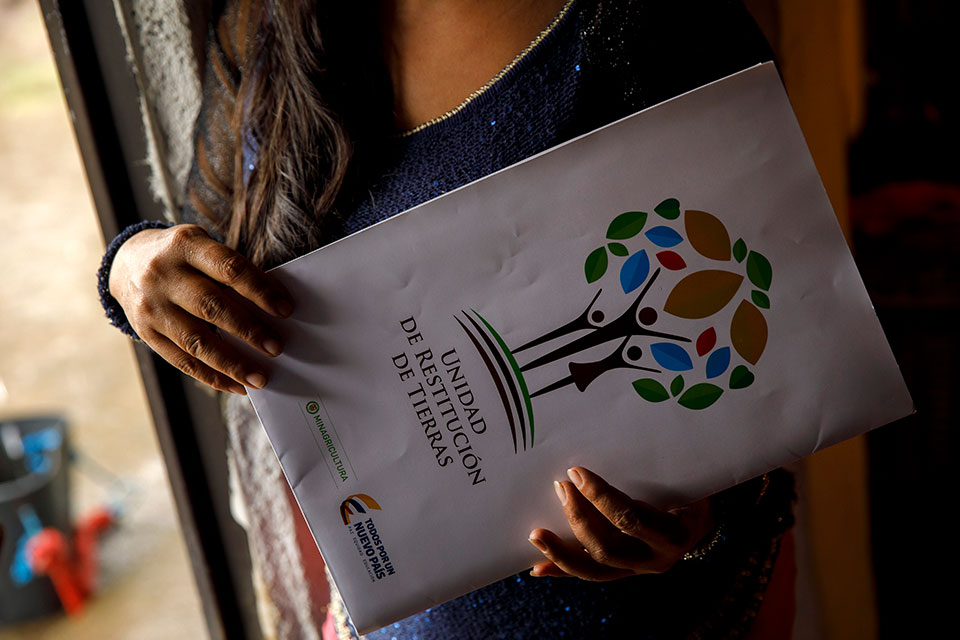
The Victims and Land Restitution Law (Law 1448) is trying to return illegally acquired land to its rightful occupants. In many cases, the land restitution process formalized the ownership of land for those who had already returned to their land but did not have formal documents to prove ownership. Since traditionally women were not landowners, they didn’t know that they could claim ownership under the new law. Through a UN Women project funded by the Government of Sweden, Cielo Gomez, along with other men and women from this area, learned about their right to land and developed leadership and business skills.
“The training taught me how to be an entrepreneur and how to be independent,” explains Cielo. “I also learned about my own body and my rights. I learned that I was able to go to a bank, get a loan and buy land! A year and a half ago, I did that! I took out a loan and bought another piece of land.”
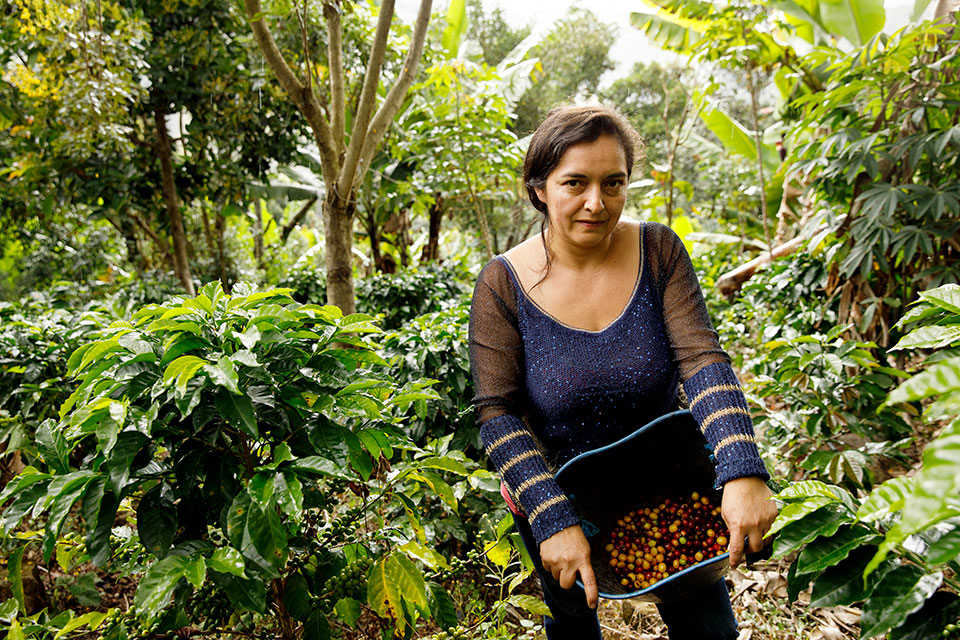
For Cielo Gomez, peace is waking up at dawn, drinking coffee with her family, and then going to her coffee field. She is dreaming of starting her own coffee business and sending her daughter to the university.
“Right now, I feel safe,” she says.
“The Conflict hasn’t ended for us”
From the mountains, it’s a 216-mile (349 Km) drive to the Pacific coast of Colombia, where the township of Tumaco, also part of the Nariño territory, sits under the hot sun. The population is predominantly Afro-Colombian. Here, armed soldiers still monitor the streets, and safety feels less certain.
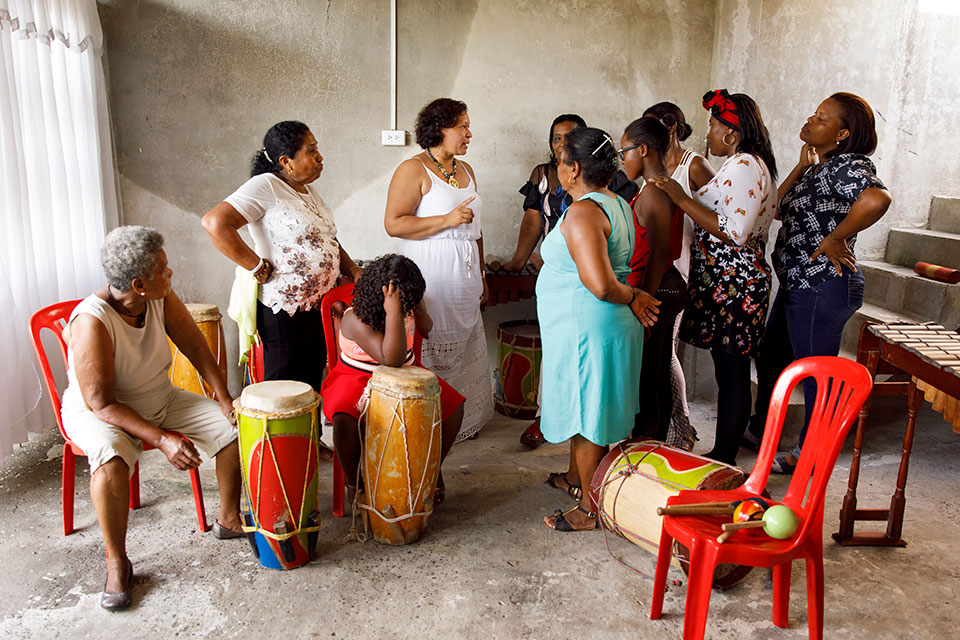
On the second floor of a house with an unfinished balcony, a group of women of all ages have gathered to sing together. They are part the Cantadora network of singers who use traditional Afro-Colombian music to preserve their culture and promote peace.
Paola Andrea Navia Cassanova is the cofounder of the Network and explains: “This project is about leadership of women. Singing is a political expression of Colombian women from the Pacific coast, it’s a tool for them to [uplift] the voice of women.”
“For me, the cantadoras [singing women] are about protection, resilience and resistance.The true stories are told by people singing about their realities. [In this network] we have women displaced by the conflict, children and young people who have lost their families.”
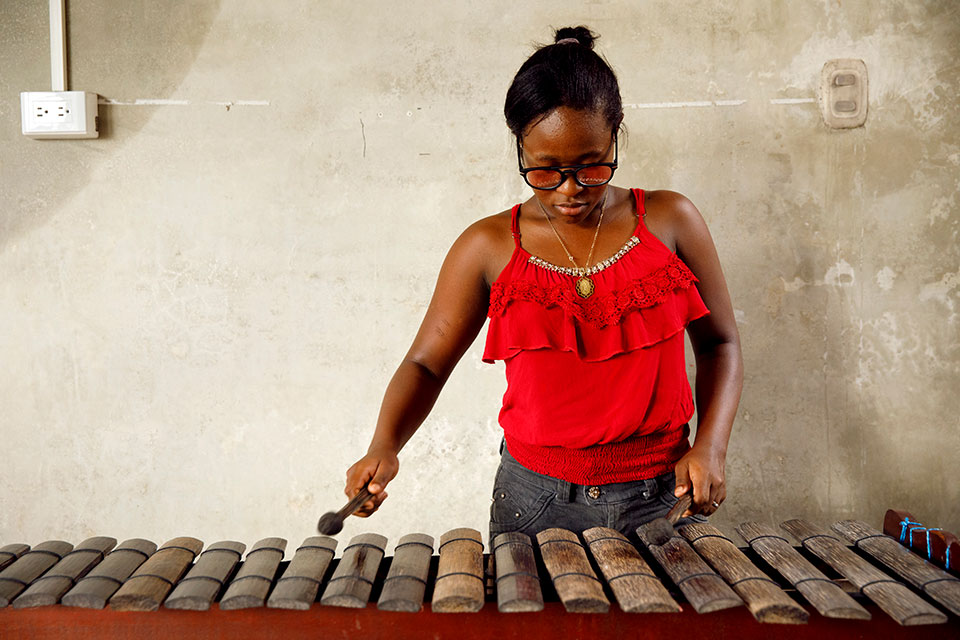
Mila Mosquera Rodriguez is one of the younger members of the network. The Network has given her hope and a safe space, and also pride in her cultural heritage.
“When I listen to a drum, I feel like it’s calling my name,” says Mila.
“Once you join the Cantadoras group, you don’t think about weapons anymore, because the free time and the emptiness you felt in your life is now filled with music. In Tumaco, the conflict hasn’t ended for us. We have a peace agreement, but look around you…”
The evening is plunged into darkness around Mila. A guerilla group had bombed the power station.
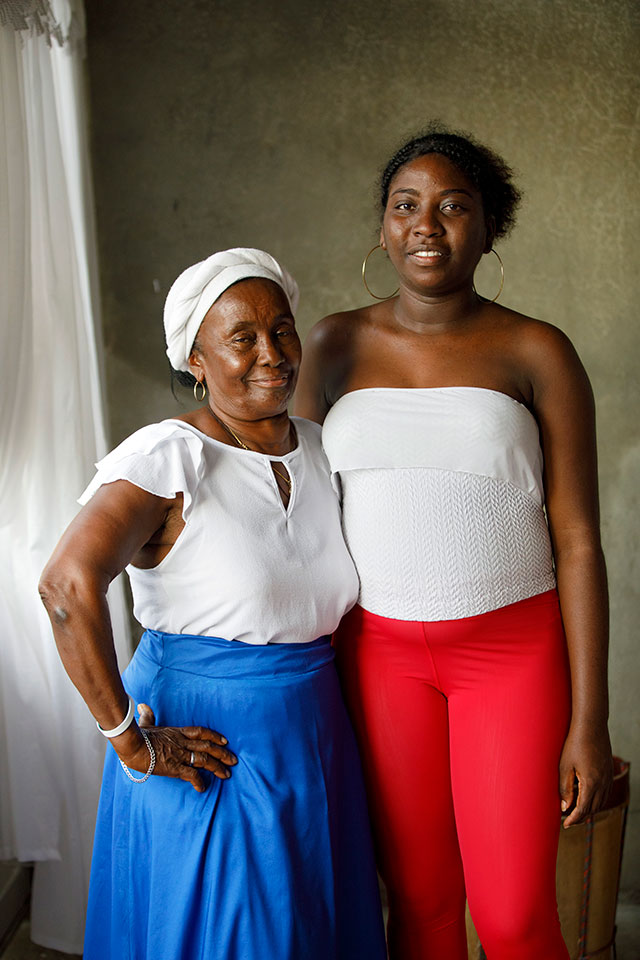
Mila remembers losing her cousin and a musician to recent violence: “I was at the cemetery during the burial. Next to me stood a woman. A young boy came into the cemetery and shot her dead. She fell near my feet. For the first five minutes, I just stood there, paralyzed with fear. Then, I ran.”
“The young people in my community need safe spaces and opportunities to do things they like to do, like sport, music, painting; they need work.”
Alba Maria Valencia Preciado agrees with Mila. She is in her 70-s now and comes from a long tradition of cantadoras. She started singing when she was only 10 years old.
“Preserving this music is important because this music is fun and freedom for us,” she says. “Some young people have stopped appreciating this music, but others are carrying on the tradition. I have created a small group of children, I call this group, “the seeds”. When I die, this tradition of music will continue.”
Alba Maria arrived in Tumaco with only the clothes on her back and seven children in tow. She had fled unspeakable violence in her village.
“My village was called “the mermaid”, it used to be beautiful.”
Next to Alba Maria sits Ana Jimena, her daughter, also a singer. Jimena was too young to remember the journey to Tumaco, but she has grown up amidst violence in the barrios.
“Here in Tumaco we have a lot of gangs. They fight for control over the different zones because of the drug trafficking,” she explains.
Jimena will give birth soon, and wants peace, desperately.
For her peace would mean: “I have the resources to feed my unborn daughter, that she is able to go to school and then to the university. And, I want her to grow up learning our culture and our music, that’s all.”
“There is a lot of food insecurity here”
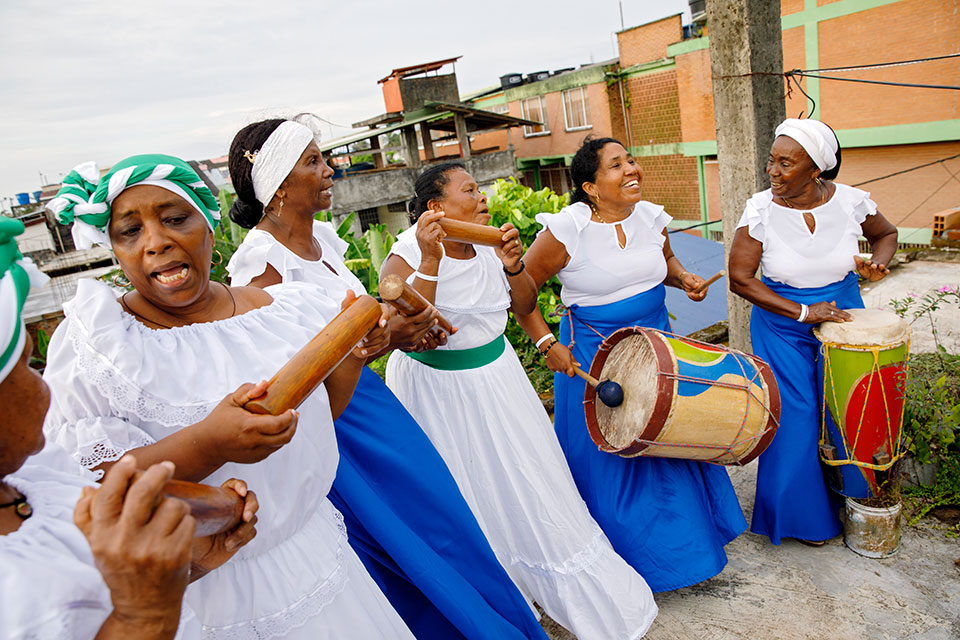
Not too far from the Cantadoras is another group of women trying to sow the seeds of peace, one farm at a time.
Started by six women, five of whom had studied agroforestry, Foundation of Women Entrepreneurs of the Pacific (FMEPAC) helps women farmers in and around Tumaco to grow food and recover the land that had been used to cultivate coca through generations.
Tumaco is one of the main producers of coca leaves in Colombia, used to make cocaine. For decades, impoverished farmers have grown this lucrative crop, either because of economic necessity or because they could not refuse the drug lords.
“There are 200 hectares of coca, maybe more, only in Tulmu and Panal [villages near Tumaco]. We had been forgotten by the government and the crops that are legal, their production is relatively smaller, compared to coca. It takes more efforts to trade [and make enough money] the legal crops,” explains Adriana Arizala-Mesa, one of the co-founders of FMEPAC.
“The access to the farms is difficult,” adds Yadira Ramirez Quinones, who is a 26-year old farmer and works with FMEPAC. “The farms are far, and the roads are not good. Other agricultural products cannot compete against coca. For coca, the buyer comes to the farm, buys the coca and leaves with it.”
FMEPAC worked with more than 80 women farmers in the villages of Tulmu and Panal, where the Colombian government was supporting a process of getting rid of coca crops. The process is manual and tedious. The government promised 2 million Colombian pesos every two months to each farmer who participated in the programme, but the women of FMEPAC said that only a fraction of the payment had come through and the communities were in chaos.
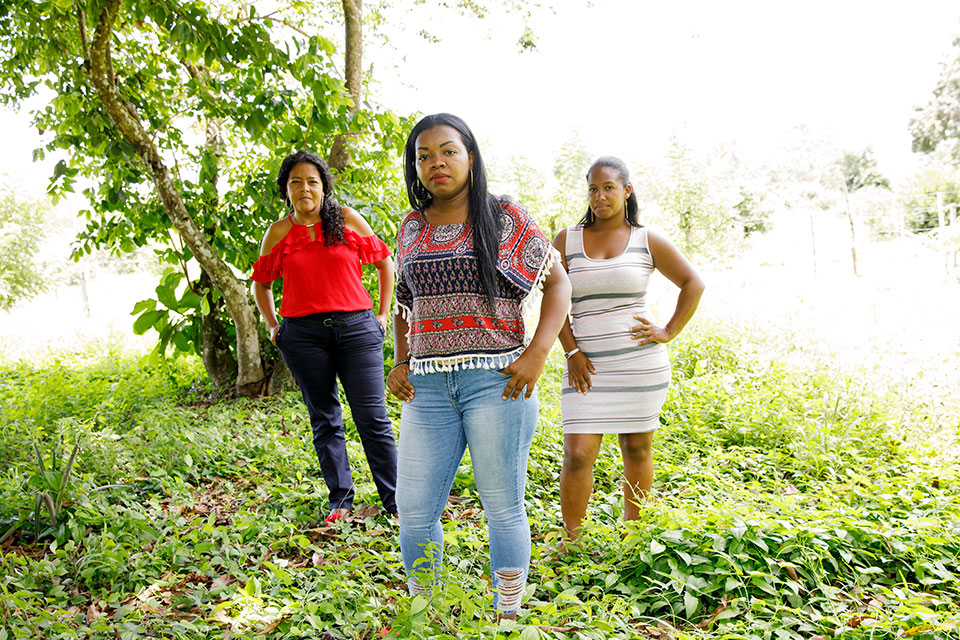
It’s hard to imagine food insecurity in this lush green land, but “there is a lot of food insecurity here,” says Yadira. “The coca needs so much space, we had to cut off all trees and other native crops that we used to grow, like plantains, yuca and our fruit trees. We also lost cocoa—which used to be the most economically important crop from this municipality.”
The farmers in this area need training to grow other crops, access to fertilizers and better roads and infrastructure so that they can access markets easily. “We have an entire generation of young people who only know how to grow coca,” says Adriana. “It is also important to help them process, market and sell [agricultural] produce.”
UN Women supported FMEPAC in implementing a project that trained women to grow native fruits and process them and market them. The project also worked with men and women to change gender norms and stereotypes.
“The training made us aware of our rights and showed us that women can do anything that men can do,” says Yadira. “We learned that we have to value ourselves.”
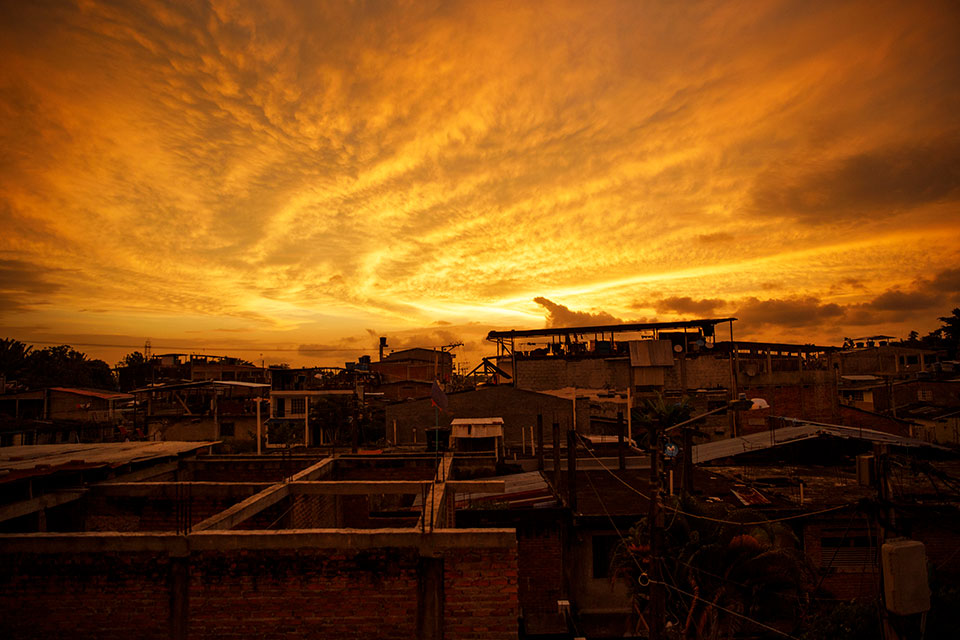
“My dream is to see Tumaco at peace, some day,” says Adriana. “I want our kids have real opportunity and walk free on our streets without being afraid. We don’t want to ask for assistance. We want to offer people products that we have. We are rich in natural resources, we want our autonomy.”
It’s the small things, the big dreams, and the endless potential that women and youth of Colombia bring to the table every day that holds the promise of lasting peace. In this journey toward peace, let women lead the way.
Notes
[1] According to the Coordination Platform for Venezuelan Migrants and Refugees (R4V), 6 June 2019. https://r4v.info/es/situations/platform